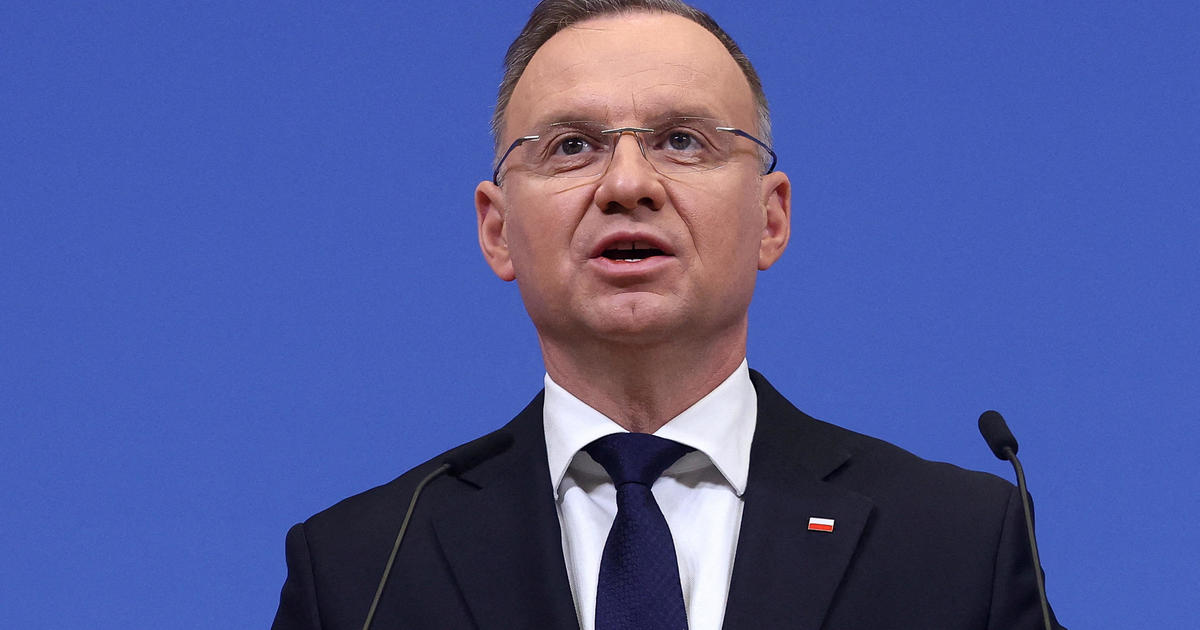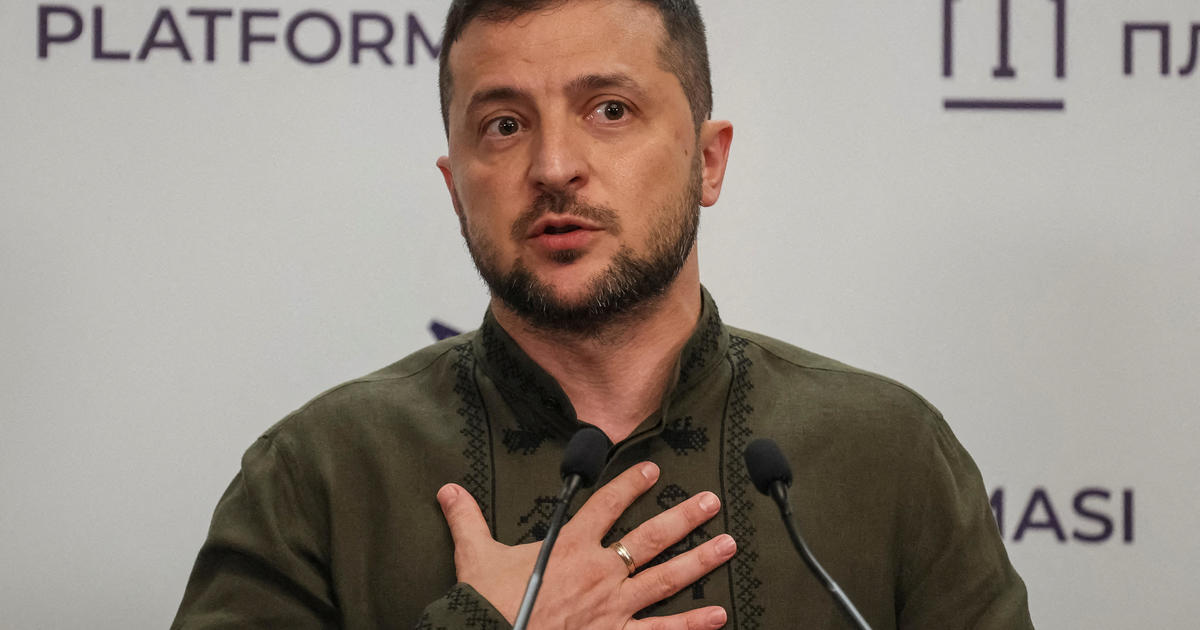Asked if he'd attack North Korea, Trump says: "We'll see"
TOKYO -- North Korea on Sunday claimed a "perfect success" for its most powerful nuclear test so far, a further step in the development of weapons capable of striking anywhere in the United States. President Trump, asked if he would attack the North, said, "We'll see."
The latest provocation from the isolated communist country reinforces the danger facing America, Mr. Trump said earlier in a series of tweets, adding that "talk of appeasement" is pointless.
"They only understand one thing!" Mr. Trump wrote, without elaboration, as he prepared to meet later with his national security team. It was the first nuclear test since Mr. Trump took office in January.
Hours later, after attending church in Washington, the president made his "We'll see" comment in response to a question from reporters.
Mr. Trump tweeted Sunday that he would meet with White House chief of staff John Kelly, Defense Secretary James Mattis and "other leaders" at the White House to discuss tensions with North Korea. In another tweet, he threatened a shutdown of U.S. trade with countries "doing business" with North Korea.
"The United States is considering, in addition to other options, stopping all trade with any country doing business with North Korea," he posted on Twitter.
Late Sunday, the White House released a statement saying that Mr. Trump called Japan's Prime Minister Shinzo Abe to discuss the latest incident concerning North Korea and to condemn the nation's latest action
"The two leaders condemned North Korea's continued destabilizing and provocative actions, confirmed the two countries' ironclad mutual defense commitments, and pledged to continue close cooperation," the statement read. "President Trump reaffirmed the commitment of the United States to defending our homeland, territories, and allies using the full range of diplomatic, conventional, and nuclear capabilities at our disposal."
The precise strength of the explosion, described by state-controlled media in North Korea as a hydrogen bomb, has yet to be determined. South Korea's weather agency said the artificial earthquake caused by the explosion was five times to six times stronger than tremors generated by the North's previous five such tests. The impact reportedly shook buildings in China and in Russia.
In an interview broadcast Sunday on "Face the Nation," CBS News senior national security contributor Michael Morell, a former acting and deputy director of the CIA, said that with every test, North Korean leader Kim Jong Un "demonstrates to us greater and greater capability."
However, "we don't know for sure exactly where he's at," Morell said.
Morell said that Mr. Trump's first option is diplomacy -- to "try to convince this person to step back from the brink."
"That's failed for the last twenty-five years," Morell said. "And there is absolutely no reason to believe it's going to be successful now."
If it does fail, the remaining options are a military one or "acceptance of this capability, containment, deterrence just the way we contained and deterred the Soviet Union," Morell said.
He described both as "very tough" -- and "bad" -- options.
Mr. Trump warned last month that the U.S. military was "locked and loaded, should North Korea act unwisely," and said the U.S. would unleash "fire and fury" on the North if it continued to threaten America.
The North's latest test was carried out at 12:29 p.m. local time at the Punggye-ri site where it has conducted past nuclear tests. Officials in Seoul put the magnitude at 5.7; the U.S. Geological Survey said it was a magnitude 6.3. The strongest artificial quake from previous tests was a magnitude 5.3.
"North Korea has conducted a major Nuclear Test. Their words and actions continue to be very hostile and dangerous to the United States," Mr. Trump said in his first of a series of tweets Sunday about North Korea.
He branded North Korea "a rogue nation which has become a great threat and embarrassment to China, which is trying to help but with little success."
China is by far the North's biggest trading partner, but Mr. Trump appeared to be more critical of South Korean President Moon Jae-in, who has attempted to reach out to the North.
"South Korea is finding, as I have told them, that their talk of appeasement with North Korea will not work, they only understand one thing!" Mr. Trump said.
China's official Xinhua News Agency said President Xi Jinping and Russian leader Vladimir Putin, meeting on the sidelines of a Beijing-led economic summit, agreed "to adhere to the goal of the denuclearization of the Korean Peninsula, have close communication and coordination and properly respond" to the test.
U.S. Secretary of State Rex Tillerson was calling counterparts in Asia, and Mr. Trump's treasury secretary, Steven Mnuchin, said he was putting together proposed new sanctions for Mr. Trump to consider that would seek to cut off trade with North Korea. It's unclear what kind of penalties might make a difference: Lassina Zerbo, head of the U.N. test ban treaty organization, said sanctions already imposed against North Korea aren't working.
North Korea's state-run television broadcast a special bulletin to announce the test and said leader Kim Jong Un attended a meeting of the ruling party's presidium and signed the go-ahead order. Earlier, the party's newspaper ran a front-page story showing photos of Kim examining what it said was a nuclear warhead being fitted onto the nose of an intercontinental ballistic missile.
Sunday's detonation builds on recent North Korean advances that include test launches in July of two ICBMs that are believed to be capable of reaching the mainland U.S. The North says its missile development is part of a defensive effort to build a viable nuclear deterrent that can target U.S. cities.
South Korea held a National Security Council meeting chaired by Moon. Officials in Seoul said Mr. Trump's national security adviser, H.R. McMaster, spoke with his South Korean counterpart for 20 minutes about an hour after the detonation.
Japan's Prime Minister Shinzo Abe called the test "absolutely unacceptable."
Nuclear tests are crucial to perfecting sophisticated technologies and to demonstrating to the world that claims of nuclear prowess are not merely a bluff.
The North claimed the device it tested was a thermonuclear weapon -- commonly called a hydrogen bomb. That could be hard to independently confirm. It said the underground test site did not leak radioactive materials, which would make such a determination even harder.
At the same time, the simple power of the blast was convincing. Japan's Defense Minister Itsunori Onodera said it might have been as powerful as 70 kilotons. North Korea's previous largest was thought to be anywhere from 10 to 30 kilotons.
"We cannot deny it was an H-bomb test," Onodera said.
North Korea conducted two nuclear tests last year and has been launching missiles at a record pace this year. It fired a potentially nuclear-capable mid-range missile over northern Japan last week in response to ongoing U.S.-South Korea military exercises.
It said that launch was the "curtain raiser" for more activity to come.
Just before Sunday's test, according to state media, Kim and the other senior leaders at the party presidium meeting discussed "detailed ways and measures for containing the U.S. and other hostile forces' vicious moves for sanctions."
The photos released earlier showed Kim talking with his lieutenants as he observed a silver, peanut-shaped device that the state-run media said was designed to be mounted on the North's "Hwasong-14" ICBM.
The North claims the device was made domestically and has explosive power that can range from tens to hundreds of kilotons. For context, the bomb dropped on Hiroshima by the U.S. had a 15-kiloton yield.
North Korea's recent activity has been especially bold.
The North followed its two ICBM tests by announcing a plan to fire intermediate range missiles toward Guam. Kim signed off on the plan, but is watching the moves by the U.S. before deciding when or whether to carry it out.
Guam is a sore point for the North because it is home to a squadron of B-1B bombers that the North fears could be used to attack their country. The U.S. on Thursday had sent the bombers and F-35 stealth fighters to the sky over South Korea in a show of force -- and North Korea strongly protested.
Options to pressure Pyongyang would appear to be limited. Further economic and trade sanctions, increased diplomatic pressure and boosting military maneuvers or shows of force would likely all be on the table.
The two Koreas have shared the world's most heavily fortified border since their war in the early 1950s ended with an armistice, not a peace treaty. About 28,500 American troops are deployed in South Korea as deterrence against North Korea.



